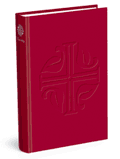
What exactly constitutes "renewal" for the Church? This is the question that is burning in my mind as the Evangelical Lutheran Church in America releases a new "constellation of worship resources" for use in parishes in the United States. Of course, there is much to be desired here: culturally broader hymnody (like it or hate it, there are more hymns from the Anglican tradition, more African hymns from Lutheran-rich Tanzania and elsewhere, and contemporary hymnody by folks like Haas and Haugen), liturgies a bit more lyrical than the Lutheran Book of Worship's (our previous book) first setting, plus Luther's Small Catechism. Were it up to me, Lutheran churches would stick to the sixteenth and seventeenth century German hymns of writers like Johann Cruger, and the ancient Latin hymns that are sparse even in the LBW.
But I really do like some of the Anglican and African hymnody, and though Haugen and Haas are way too catchy and infectious for my tastes (and a little too focused on political correctness and so-called "social justice," to the exclusion of personal holiness and confession of sin against God himself). Here, we begin to see some of the problems with the very ideological underpinnings of our new "constellation."
The renewal being pressed for by certain factions within the ELCA seem to include the jettisoning of properly trinitarian speech. I suppose I should qualify such an accusation with a caveat-- this renewal includes the option of avoiding properly trinitarian speech.
God is known to us as Father, Son and Holy Spirit. We are brought into communion with this one God through the work of Jesus, who addressed the first person of the trinity as "Father." It is a priveledge, earned by the merits of Jesus Christ and his sufferings, that we are brought into the divine family. We are adopted into a household where Jesus is "firstborn among many children." Therefore, to substitute other terms for the proper trinitarian name "Father, Son, and Holy Spirit" is unacceptable, and to elide usage of this name completely is out of step with the Christian faith which we have received from our forebears.
I understand and sympathize with feminist concerns regarding equity and justice for all human beings, and as one who seeks to live out God's commandments, through the Spirit, want to respect the dignity and giftedness of each human person. However, I find the critique of so-called "patriarchal" language narrowly moralistic, even academic. Certainly many forms of speech are offensive and to be discouraged because they seek to harm others. But that usage of masculine pronouns causes irreprable damage to females seems too much of a claim.
And this argument, when applied to the Church's trinitarian language, seems even less germaine. We use masculine pronouns for the one Jesus addressed as "Father," because to fail to use pronouns is depersonalizing. Yet we do this in full knowledge that God the Father is other than human, and thus not gendered. And we do this in humble obedience to Jesus, who taught us to pray: "our Father." That this causes offense is not reason to change a few thousand years of doctrine, but reason rather to catechize and to form people in the received wisdom of the Church, the deposit given it from the Lord.
